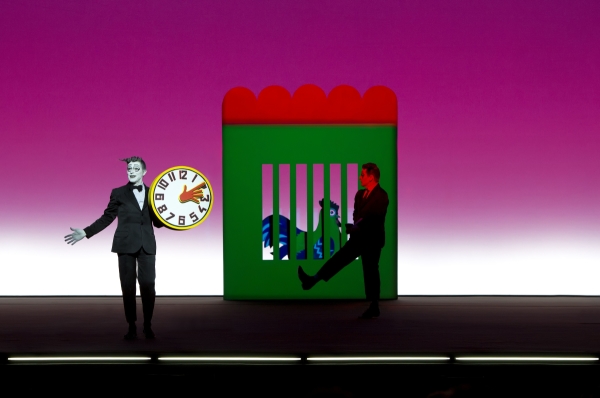The Old Woman
Robert Wilson brings Daniil Kharms’ nightmarish story to life with a theatrical sensory overload.

(© Lucie Jansch)
On February 2, 1942, avant-garde Russian author Daniil Kharms starved to death in a mental hospital in Leningrad while that city was under siege by the Nazis. Chillingly, writer Darryl Pinckney and director Robert Wilson open their disorienting stage adaptation of Kharms' novella The Old Woman with an unrelated Kharms poem about hunger:
This is how hunger begins:
The morning you wake, feeling lively,
Then begins the weakness,
Then begins the boredom;
Then comes the loss
Of the power of quick reason,
Then comes the calmness
And then begins the horror.
As Wilson is wont to do with his texts, this poem is repeated ad nauseam by the show's only two actors, Willem Dafoe and Mikhail Baryshnikov, who are now performing in the U.S. premiere at BAM's Howard Gilman Opera House. It becomes unforgettable, a permanent theatrical memory implanted by unrelenting form and content. The specter of the author haunts the stage throughout.
Kharms' original work blurs the lines of reality and fantasy, introducing a series of characters and events that are nightmarish and ephemeral. Told through faux-vaudevillian performance and schizophrenic design, The Old Woman blurs the lines of adaptation and biography. It features a disjointed story that is tonally sophisticated and narratively incoherent, leading to an unsettling and surprising evening of theater (which is saying a lot for a director whose aesthetic hasn't changed much in 40 years).
The story concerns a writer who, one day, finds the corpse of an old woman in his apartment. Fearing that he will be blamed for her death, the writer stuffs the body into a suitcase and takes it on a train ride. Then, without explanation, the suitcase vanishes.
In Wilson's version, Baryshnikov and Dafoe enter the stage with identical cowlick hairdos and faces painted clown white (the essential Wilson cosmetic). Their matching suits are distinguished by their neckwear: Dafoe wears a bowtie while Baryshnikov wears a necktie (costumes by Jacques Reynaud). They are, very clearly, two aspects of the same personality. Just who that person is, however, is never entirely clear.
In Wilson's program note, he explicitly states that both men play the writer, but neither the text nor the staging identifies him as such. Sure, the two men repeat sentences over and over like a writer looking for the perfect diction and syntax; but actors in Wilson's plays are always repeating things, so this is not particularly remarkable. In fact, both men repeat the line "Remember, I am a chemist" until it is impossible to forget. Is he a chemist or a writer, composing a story about a chemist? Things only get more confusing from there.
At a certain point, a large projection of Kharms' mug shot appears on the upstage wall, suggesting that the person on stage is Kharms. When Baryshnikov appears later holding a constructivist pipe (Kharms was known for his Sherlock Holmes-inspired dandy look), it seems to reinforce this notion. Of course, unless you are familiar with Kharms before seeing the show, you may not get any of this from just watching the play. This is definitely one for which a little homework pays off, and is imperative for those who crave narrative clarity above all else.
Dafoe (who recently collaborated with Wilson on The Life and Death of Marina Abramović) vigorously throws himself into Wilson's world, repeating the lines in his familiar, gravelly voice, even when he's winded by the restless and frenetic choreography. Baryshnikov moves with all the poetic grace one would expect from a star of the ballet world. Of the two, his mood is distinctly more angst-ridden and melancholy. Amazingly, each manages to find a distinct character and expression within Wilson's strict formalism.
The director bombards the audience with his typical mix of harsh lighting, sharp angles, and gigantic props. Askew windows fall from the sky as sausage links ascend to heaven. The performers move through giant rectangles of white light while shrieking hysterically. Actors and set pieces seem to change color with every beat, like theatrical chameleons that can be customized on a whim.
Marco Olivieri's aggressive sound design facilitates those lighting and color shifts with a cartoonish snap. His soundscape invades every moment onstage, setting the tone more than any other element. Hal Willner's original music is epic and grandiose; it wouldn't feel out of place in a Hollywood adaptation of a Robert Ludlam novel. Olivieri reinforces this cinematic tone with dark and foreboding voiceovers. It's amazing just to take in the sensory overload. Despite these arresting elements, those looking for a clear and accessible story will be frustrated. Of course, the same could be said of the source material.
When the Soviet Union criminalized the avant garde in 1931, viewing such high-brow inaccessibility as decadent and bourgeois, Kharms and his inscrutable work became easy targets. This eventually led to his arrest and internment.
Luckily, we are living in a gentler time and place. Avant-garde artists are not imprisoned or executed, but merely ignored or embraced by the establishment. As Wilson's plays are regularly presented by the most respected cultural organizations in the world, he belongs to the latter group. It's pretty tough to think of oneself as avant-garde when one's show is sponsored by Bloomberg and Bank of America. Still, as he watched several audience members over the course of the play flee up the aisle in philistinic disdain, I have to imagine Wilson thought to himself, I've still got it.









